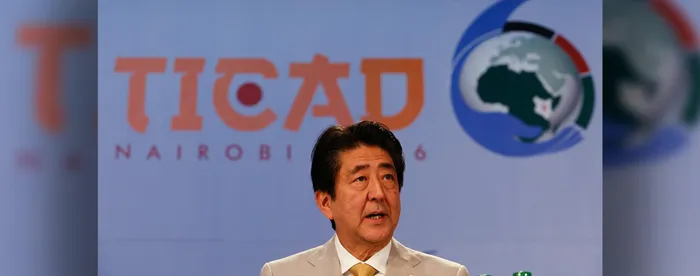Japan walks the talk in building relations with Africa

The late former Japanese Prime Minister Shinzo Abe stressed the need for Japan and Africa to work together ‘to safeguard the Indo-Pacific which connects Africa and Japan, with great care as an international public good’. Picture: EPA
Graphic: Timothy Alexander – Since the inaugural International Conference on African Development Summit in 1993, Japan has availed up to $47 billion targeting socio-economic development in areas like human capital, water supply, education, and healthcare, the writer says.
By David Monyae
Japan and Africa will mark another milestone in their relations when the leaders of the two sides gather in Tunis on Saturday, August 27, for the 8th Tokyo International Conference on African Development (TICAD).
Now on the verge of clocking three decades of existence, TICAD is the oldest of the now-fashionable Africa+1 summits. Over the years, TICAD has become a platform for the institutionalisation of Japan-Africa relations giving the two parties an opportunity to consult and exchange ideas on issues of mutual interest. In 2010, the African Union Commission (AUC) officially became a member of TICAD giving it a pan-African scope. Underpinned by a stable institutional framework, the co-operation between Japan and Africa has grown tremendously in the economic, diplomatic, and cultural spheres.
Since the inaugural TICAD Summit in 1993, Japan has availed up to US$47 billion targeting socio-economic development in areas like human capital, water supply, education, and healthcare. The Japanese foreign direct investment (FDI) stock in Africa grew from US$758 million in 2000 to US$10.5 billion in 2014. According to the 2019 edition of the list of Japanese companies doing business in Africa, there are 563 Japanese companies operating in 54 African countries in industries like electronics, automobiles, textiles, and energy among others.
This is evidence of Japan walking the talk. This represented more than 25 percent growth from 440 Japanese who were doing business in Africa in 2015. At the 6th TICAD Summit in Kenya in 2016, the late Japanese Prime Minister Shinzo Abe committed to increasing Japanese investment in Africa by US$30 billion before pledging another US$20 billion at the 2019 Summit in Yokohama. These investments are critical for the transformation of Africa’s economic structure and the creation of jobs for hundreds of millions of Africa’s young people.
However, more needs to be done to improve trade between Japan and Africa, which stood at US$16.5 billion in 2020. Further, more than 1,200 Africans have benefited from the Africa Business Education Initiative that was launched in 2013. The ABE Initiative grants scholarships to African students to study at Japanese universities after which they are placed in internships in Japanese companies.

Japan and Africa also share geostrategic interests in the Indo-Pacific region that encompasses the Indian and Pacific oceans and the countries bordering it. At the 2016 Summit, PM Abe stressed the connection of Africa and Asia through the free and open sea lanes of the Pacific and Indian Oceans. “Japan bears the responsibility of fostering the confluence of the Pacific and Indian Oceans and of Asia and Africa into a place that values freedom, the rule of law, and the market economy free from force or coercion.”
In 2019 he reiterated the need for Japan and Africa to work together “to safeguard the Indo-Pacific which connects Africa and Japan, with great care as an international public good”.
The Indo-Pacific is critical to the economic interests of both sides as it carries important supply chains of energy and other critical merchandise. Japan has been investing in port infrastructure along Africa’s Indian Ocean coastline. For example, it has invested in the Tomasina port in Madagascar, the Nacala port in Mozambique and the Mombasa port in Kenya. These investments will improve African connectivity and also increase Africa’s trade capacity in the Indian Ocean.
In addition to investment, Japan is also involved in peace and security in Africa’s eastern seaboard. The East Asian giant has provided guard boats and pirate surveillance equipment to Kenya and has helped capacitate the Djibouti Regional Training Centre by making available guard boats and patrol vessels. This will go a long way in securing the Gulf of Aden, which has been plagued by pirates making it a high-risk area for transportation. As such, Japan is indeed a major ally for Africa.
However, the upcoming TICAD does not take place in a vacuum. It comes in the context of rising geopolitical tensions between the West and the East over trade and the Russia-Ukraine war. It would be counter-productive for Japanese and African leaders to approach each other along geopolitical lines. Japan-Africa relations have survived geopolitical shifts in the past and they are likely to outlive the current geopolitical conflict. It is important for both parties to cultivate the inherent value and potential of their relationship regardless of the prevailing geopolitical environment. Africa must maintain its strategic autonomy and avoid being swayed by Japan’s economic might.
Moreover, there is a need for Japan and Africa to work hard at publicising their partnership. Public consciousness of the Japan-Africa relations is minuscule due to lack of effective public communication and very scant media coverage compared to other summits. The TICAD must also do more to incorporate the civil society and grassroots organisations in its structures in order to shed its current elitist image. This will boost the legitimacy of the summit and its outcomes.
David Monyae is an Associate Professor of International Relations and Political Sciences and Director of the Centre for Africa-China Studies at the University of Johannesburg
This article is original to the The African. To republish, see terms and conditions.